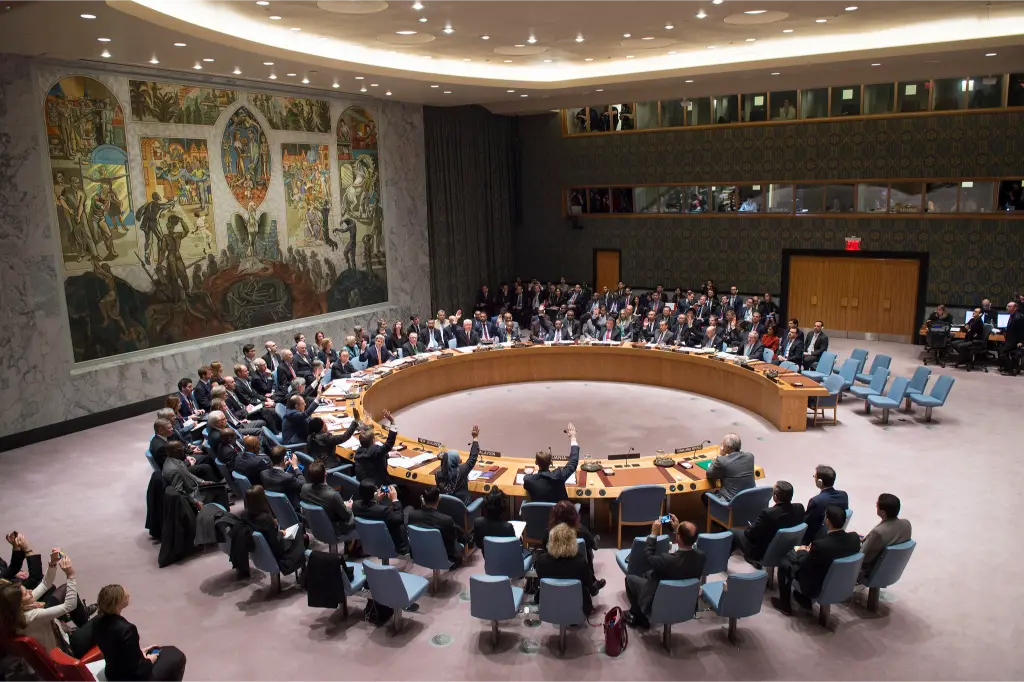The UN Security Council delayed a vote for a third time on a resolution for a ceasefire and increased humanitarian aid in Gaza. This postponement reflects the U.S.’s reluctance to endorse a resolution potentially critical of Israel’s military actions in Gaza. The resolution, originally set for early this week, has been rescheduled for Thursday after extended negotiations.
U.S. President Joe Biden told reporters on his way back from Milwaukee, Wisconsin that “we’re negotiating right now at the U.N. the contours of a resolution that we may be able to agree to.”
Key points of contention in the draft include terms for a ceasefire and establishing a UN monitoring mechanism in Gaza. The resolution aims to cease hostilities, ensure unhindered humanitarian access, release hostages, and address their medical needs. It emphasizes the severe humanitarian crisis in Gaza, highlighting insufficient access to essential services for civilians.
The resolution also advocates for a two-state solution, uniting Gaza and the West Bank under the Palestinian Authority. It urges Israel to open the Kerem Shalom Border crossing for direct humanitarian aid to Gaza. Diplomats hope to modify the language to gain U.S. support or abstention, crucial for the resolution’s passage due to the U.S.’s veto power as a permanent UNSC member.
The U.S. National Security Council is still discussing the resolution’s details. Biden, highlighting ongoing UN negotiations, refrained from commenting on Israel’s conflict intensity with Hamas. The U.S. has condemned the Hamas attack on October 7 but is under pressure to address the civilian casualties in Gaza from Israel’s response. According to Hamas’s Health Ministry, nearly 20,000 Palestinians have died since October 7. Israel claims approximately 8,000 of them are terrorists.
During a Security Council meeting, the U.S. Deputy Ambassador emphasized protecting civilians and journalists and the need for vital humanitarian aid in Gaza. The U.S. has previously vetoed similar measures and voted against a ceasefire in the UN General Assembly. The General Assembly recently voted for an immediate ceasefire in Gaza, a nonbinding decision contrary to the U.S. position in the Security Council.
As part of the U.S. push at the U.N., Blinken spoke Wednesday with the foreign ministers of France, Germany and the United Kingdom. He “stressed the importance of urgently addressing humanitarian needs in Gaza, the imperative of minimizing civilian casualties, and the need to prevent the conflict’s further escalation … and ”underscored the U.S. commitment to the establishment of an independent Palestinian state,” State Department spokesman Matthew Miller said.
U.N. Secretary-General António Guterres has said Gaza faces “a humanitarian catastrophe” and that a total collapse of the humanitarian support system would lead to “a complete breakdown of public order and increased pressure for mass displacement into Egypt.”
U.S. National Security Council spokesman John Kirby had also raised two other issues earlier this week that were not in the Arab-sponsored resolution, namely, condemnation of Hamas’ deadly Oct. 7 incursion into Israel that sparked the latest war and Israel’s right to self-defense.
“It’s important for us, if the Security Council is going to speak on this, that there’s a condemnation of Hamas and what they did on the 7th of October, there’s a recognition of the need for Israel to be able to defend itself, and there’s of course, significant commitment by all members on getting humanitarian assistance into the people of Gaza,” Kirby told reporters aboard Air Force One.
What is clear is that the UN must pass this much-needed resolution. With the U.S. on board, the resolution will have even more weight and its message will carry greater meaning. Only with sustained awareness and a unified call for aid can Gaza’s helpless civilians hope for a brighter future. Today, they are suffering. Soon, with the UN’s help along with the international community, they will have a state they can call their own. But until then it is incumbent on the international community, through the UN, to help fight for their rights and help keep their dreams alive so that when the war ends, they can rebuild their lives anew.
